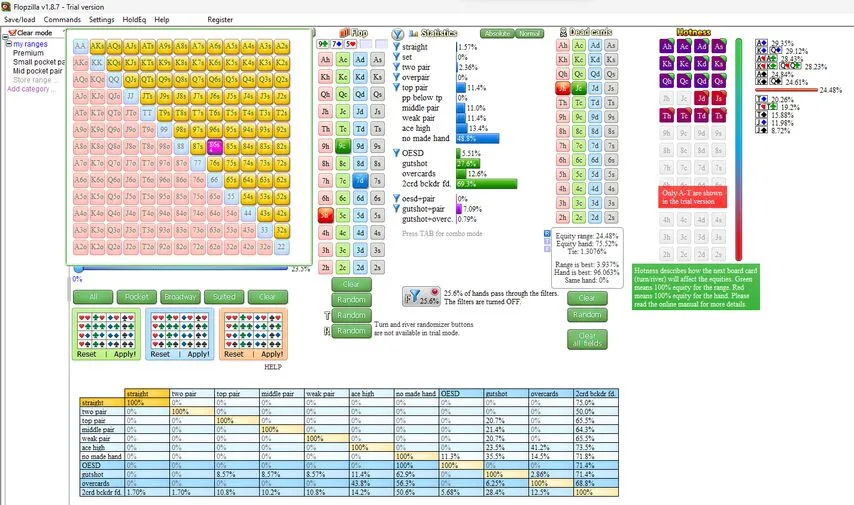Dozens of books and thousands of articles have been written about poker. Famous players have also formulated unofficial rules and advice. Some of these will shape your strategy in the right direction.
Nobody will tell you to follow any theorem in 100% of situations. They may be true in most cases, but don’t blindly apply any strategy or you’ll become predictable. Let's explore the most popular poker theorems and evaluate their reliability.
What Is a Poker Theorem?
In exact sciences, a theorem is a mathematically or logically proven statement. We generally accept theorems as truths, but that doesn’t work the same in poker.
In poker, a theorem has a slightly different meaning. Poker theorems fall into two categories:
• Advice from successful players for various situations. After years of establishing and proving their skill, the words of poker legends can be useful.
• Fundamental rules based on game mathematics and key concepts. Certain ideas and strategies hold true (in most cases). For example, playing more hands when you are in the correct positions is going to be advantageous in the long run. Another example would be keeping a reasonable VPIP and not entering the pot with too many hands.

10 Popular Poker Theorems
These popular poker theorems aren’t arranged in the order you should learn them, or by any other metric. Some may resonate more than others, so quickly browse these 10 and see which stands out more.
• David Sklansky's Fundamental Theorem: If you make decisions your opponent expects, and they can see your cards, you'll lose. If you make unexpected decisions, you'll win. Sklansky first introduced this concept in "The Theory of Poker." The idea is to use as much information as possible to narrow down your opponent's range.

• Zeebo Theorem: No player can fold a full house. While not 100% accurate, it's generally true for amateurs. Professionals can fold strong hands when behind. Against others, try to take the entire stack if you suspect they have a weaker full house. Bluffing against a full house is pointless. The exception is when an obvious higher full house is possible, through a paired board that didn’t favor your hand.
• Beluga Theorem: A pair becomes significantly weaker if the opponent raises on the turn. While still relevant, it's not an automatic fold. The correct decision depends on the opponent's playing style. Against cautious players, fold more often; against aggressive ones, defend more.
• Yeti Theorem: Re-raising on a dry flop is often a bluff, especially on paired boards. This concept doesn't work in practice. In modern poker, players often 3-bet with strong hands in such situations.
• Aejones Theorem: Assume the opponent never has a good hand. While absurd in its pure form, it can be useful when playing against wide ranges. Don't be afraid to pressure your opponent. This can be verified using poker calculators and solvers. The best software can be purchased in the GipsyTeam store.
• Ama Theorem: If your opponent min-raises on the flop, their hand is always stronger, but pot odds prevent folding. This applies mainly when playing against beginners or amateurs. 3-betting as a bluff is useless in these situations.
• Clarkmeister Theorem: Always bet the river in heads-up play if a suited fourth card appears. However, consider the action on previous streets before deciding. If you want to bluff, ensure your story is consistent and your opponent has many weak hands in their range.
• Shalamov Theorem: A humorous concept stating, "If you're dealt two Kings, an Ace will definitely appear on the flop."
• There are two main reasons to bet: to beat stronger cards or to make a weaker hand pay. This helps you think in the right direction when choosing your bet size.
• Money in poker is made at the expense of weak players: The statement seems obvious, but even professionals often forget about it. Playing against equal and stronger opponents is justified in situations where the goal is not money, but sporting interest.
If you’re interested in learning more poker skills, consider getting hands-on with inexpensive training software.

Flopzilla is one program that could be a starting point. The tool will teach you to think more in ranges and escape the “they have it or don’t have it” thinking that many amateurs get attached to.
Poker Site Reviews Section
All of the poker theorems in the world won’t be helpful if you play in the wrong places. Poker rooms differ in various aspects and some will suit you much better than others.
Evaluate a poker site based on:
• Peak traffic times when more games with weaker opponents are available
• Available formats and disciplines
• Bonuses and loyalty programs
• The rake
• Withdrawal methods and terms
• Software convenience for PC and mobile devices
• Tracker support for poker statistics programs
Regular players must be wary of the rake and rakeback, while casual poker players should focus more on freerolls and bonuses.
One thing that all players need, regardless of skill, is a reputable place to play. Our reviews will let you know if there are reports of unfair practices, bots, or other hazards. If you need help choosing, search for high ratings in our poker rooms section or connect with our 24/7 support service, which is completely free.
- Increased first deposit bonus
- Increased rakeback and reloads
- Help with deposits and cashouts
- Access to private freerolls
- Round-the-clock support
























